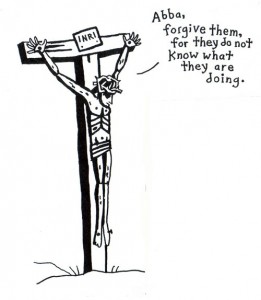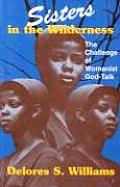 I wrote earlier this season about how I’m probably Failing Lent. I hinted there that I’d write more about my lack of enthusiasm for this season, and so here are a few words about how I’m failing Easter too. I’ve been failing Easter every since my feminist consciousness started coming to theological terms with this thing called atonement – the ancient Christian idea that Jesus’ death does something to reconcile God and humans.
I wrote earlier this season about how I’m probably Failing Lent. I hinted there that I’d write more about my lack of enthusiasm for this season, and so here are a few words about how I’m failing Easter too. I’ve been failing Easter every since my feminist consciousness started coming to theological terms with this thing called atonement – the ancient Christian idea that Jesus’ death does something to reconcile God and humans.
I know the moment when it all changed: When I was 21 and heard Joanne Carlson Brown speak about how classical Christian atonement theory is little more than divine child abuse. I read her essay with Rebecca Parker, “For God So Loved the World?” which had been published in 1989 in Christianity, Patriarchy, and Abuse. I saw in stark relief the line connecting women’s experiences of violence and violation in a patriarchal culture to a religion that valorizes suffering, specifically the suffering of the obedient son at the hands of his father.
A sample:
“Christianity has been a primary—-in many women’s lives the primary—force in shaping our acceptance of abuse. The central image of Christ on the cross as the savior of the world communicates the message that suffering is redemptive. If the best person who ever lived gave his life for others, then, to be of value we should likewise sacrifice ourselves. Any sense that we have a right to care for our own needs is in conflict with being a faithful follower of Jesus. Our suffering for others will save the world.”
 Around the same time, Delores S. Williams was criticizing Christian fetishizing of the cross by looking at it from the perspective of black women, women whose bodies have been routinely and as a matter of federal law subject to violence and forced surrogacy. In Sisters in the Wilderness in 1995, she says that:
Around the same time, Delores S. Williams was criticizing Christian fetishizing of the cross by looking at it from the perspective of black women, women whose bodies have been routinely and as a matter of federal law subject to violence and forced surrogacy. In Sisters in the Wilderness in 1995, she says that:
“Humankind, then, is redeemed through Jesus’ ministerial vision and not through his death. There is nothing divine in the blood of the cross.”
Rather than continue to valorize death and systemic violence and tragic bloodshed, she suggests that we consider Jesus’ life and radical ministry as that which is lifegiving.
This work is part of a whole field of feminist criticism of atonement theory and the cross. My own dissertation research and first book was in part an extended effort to deal constructively with the harsh truth that is revealed when you take women’s experiences of violence and abuse seriously in Christian theology.
I don’t know that I’ve reconciled it all yet, or that I ever will. Because the cross is embedded at the heart of the Christian tradition. The death of Jesus is fixed in place as a part of the redemption narrative. And so we are left with hymns and images and other Christian ritual worship of an instrument of torture and death. Yuck. 
As Kimberly over at Coming Out Christian said recently and more eloquently than my ‘yuck’:
See, I am the sort of Christian that is not theologically down with the whole subsitionary atonement [sic] thing – especially penal.
First of all is the deeply disturbing (and some would say heretical) idea of a God that would NEED a sacrifice of one innocent to pay for the sins of the rest of our sorry asses. A blood thirsty God is frankly a warped vision of the Divine cast in our own vengeful image. Second is the more esoteric question of HOW exactly such a sacrifice would pay for “sins”? There simply has been no answer to this question that I have encountered in my reading, praying, discerning life that satisfactorily answers this big fat how.
But about the Cross – we are not washed clean by his blood, we are convicted as a cruel and blind race that will execute our God when God comes to us as a poor man healing on the sabbath, overturning the worship of mammon in the temple, confronting the religious elite and and challenging the authority of the state.
We are not saved by the crucifixion, we are damned by it – or we could have been. Let us face that shameful dark day and accept our culpability – knowing that if Jesus returned today to preach the gospel to the poor, to proclaim release to the captives and recovery of sight to the blind, to set free those who are oppressed His blood would likely run in rivulets once again. And let us move through that desolate Saturday knowing what we have done. And let us arise on Easter surprised by Grace.
 To be surprised by grace. This idea I like. Grace given in spite of the horrors that we humans continue to inflict upon each other, especially the vulnerable and marginalized in this white supremacist capitalist patriarchy … women, people of color, sexual minorities, the poor.
To be surprised by grace. This idea I like. Grace given in spite of the horrors that we humans continue to inflict upon each other, especially the vulnerable and marginalized in this white supremacist capitalist patriarchy … women, people of color, sexual minorities, the poor.
And even on one who spoke the truth about these systemic injustices, Jesus himself.
Now, the question stands: what are we going to do with that gift freely given?
Images via: Dan Erlander; Christa (Brooklyn Museum, Sackler Center for Feminist Art); pregnant Christ image from the Russian Bishops House in Sitka, Alaska.












